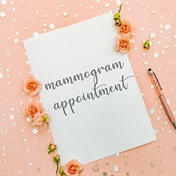
A one-size-fits-all approach in urging women to get mammography screening for breast cancer is not supported by evidence, US researchers say, and it shows too much fear.
A series of articles in the Journal of the American Medical Association (JAMA) reviews the risks and benefits of screening mammography at different ages, and concludes women need more tailored advice and better quality information than they're getting.
Mammograms are generally linked to a reduced risk of dying from breast cancer, though not equally for everyone, and the tests are also associated with real harms, write Dr Lydia Pace and her co-author in a review of the numbers on screening.
Read: Mammography doesn't reduce breast cancer death rates
Data not perfect
"I think it would be easier for everyone if there was a clear pre-specified pathway with a given risk profile, but we don't have that because our data is not perfect and everyone is different," Pace, from Brigham and Women's Hospital in Boston, told Reuters Health.
"I wish that we had more certainty," Pace said. Pace and her colleague point out in their JAMA report that an estimated 40 000 women die of breast cancer in the US each year. The government-backed US Preventive Services Task Force (USPSTF) broke from many other organisations in 2009 and began recommending women at average risk for breast cancer get mammograms every two years starting at age 50.
The USPSTF's decision was based on evidence that screening leads to more benefits among older women who are screened less frequently, according to Pace. Many US organisations continue to recommend annual mammograms starting at age 40, however, an editorial accompanying the report notes that most other countries have guidelines similar to the USPSTF recommendation.
For their review, Pace and her colleague gathered previous studies that have examined the risks and benefits of mammograms. They found that annual mammograms are tied overall to a 19% drop in breast cancer deaths, but that the actual decrease depends on the age of the women. For example, 190 invasive breast cancers would be diagnosed if 10 000 women in their 40s receive mammograms every year.
False-positive results
Of those diagnosed, mammography would save about five lives but 25 women would die with or without the mammograms. The number of diagnosed cancers, deaths and lives saved would be slightly higher among 10 000 women in their 50s who get yearly mammograms. For women in their 40s and 50s, however, a decade of screening would also see more than 6 000 false-positive results and over 700 unnecessary biopsies.
In addition, of the 190 women in the same group of 10 000 who would be diagnosed with breast cancer after yearly mammograms during their 40s, the researchers estimate that 36 of those cancers would never have caused harm during the women's lives. That means those 36 women would have unnecessarily received surgery, chemotherapy and other treatments without gaining anything in return.
For women older than 70, screening decisions should also take into account a woman's other health issues and her reasonable life expectancy, according to Dr. Louise Walter, of the University of California, San Francisco, and her coauthor Dr. Mara Schonberg of Harvard Medical School.
In a separate article, they calculate that screening every two years after age 70 would avert two breast cancer deaths among every 1 000 women screened. It would also yield 200 false positive results per 1 000 women screened and 13 cases of over diagnosis – finding and treating a cancer that would have done no harm – per 1 000 women screened.
Read: Breast cancer: all you need to know
Malpractice claims
Once again, the researchers conclude, women need to talk with their doctors about their individual risk and their preferences, when it comes to making decisions on screening. In their editorial, Drs. Joann Elmore and Barnett Kramer suggest that too much advocacy for screening, and doctors' worry about malpractice claims if they don't recommend screening, have skewed conversations about the risks and benefits of mammography. They write, "patient fears and physician concerns are not conducive to truly informed shared decision making about a complex choice."
Doctors should be talking to women about their realistic risk of being diagnosed with breast cancer. But that can be difficult, according to Elmore, who is at Harborview Medical Centre in Seattle, and Kramer, from the National Cancer in Bethesda, Maryland. They write that women may hear they have a one in eight chance of being diagnosed with breast cancer, but they may not understand that is over their entire lifetime and does not mean death.
"Indeed, women do have an increased fear and increased perception of risk of breast cancer," Elmore told Reuters Health. "This one in eight statistic sounds very scary. It's really hard to take all these numbers and put it into something that's easy to digest," she said.
Elmore said women can use an online tool from the National Cancer Institute that allows women to calculate their risk of developing breast cancer during the next five years. "We can encourage and share with them our thoughts, but we shouldn't make them feel guilty or bad about the decision they make," she said. "We should just try to help them so the decisions are informed."
Read more:
Mammograms may not lower breast cancer death rate
Breast cancer screens don't save lives
More benefits of mammograms
Image: Mammogram from Shutterstock




 Publications
Publications
 Partners
Partners











